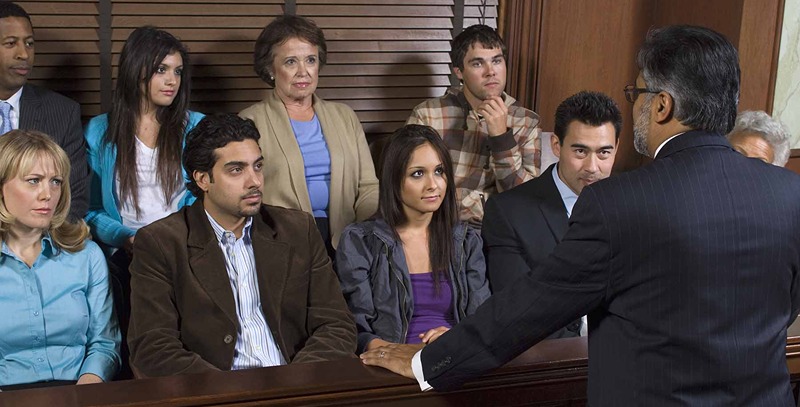Whether to Accept a Plea Bargain in an Arizona Criminal Case or Not

At Kolsrud Law Offices, we understand that accepting or rejecting a plea deal is one of the most important decisions you make when facing criminal charges.
A plea deal is essentially a negotiated agreement between you, the defendant, and the prosecuting attorney. In most cases, you would plead guilty or no contest to certain charges and, in return, receive certain benefits such as reduced sentencing or fewer charges.
Given that the Bureau of Justice Statistics reports that over 90% of criminal cases conclude through plea agreements rather than trials, it's important to understand your rights and the implications of a plea deal before deciding whether to accept.

Understanding the Types of Plea Deals in Arizona
There are mainly three types of plea deals in Arizona, regulated under Title 13 of the Arizona Revised Statutes. These are:
➤ Type 1: Charge Bargaining
In charge bargaining, the prosecutor agrees to drop some charges in return for a guilty plea to a less severe charge. For example, in a case involving multiple drug possession charges, a prosecutor might agree to drop some of them in exchange for a plea to a single, less severe drug charge.
- Rules and Procedures:
- It requires court approval, and judges will evaluate whether the plea serves the interests of justice.
- According to Arizona Revised Statute §13-116, a defendant can't be convicted of both the offense charged and the lesser or greater offense unless the conviction is supported by different evidence.
➤ Type 2: Sentence Bargaining
Here, the defendant pleads guilty with the expectation of receiving a lighter or alternative sentence. For instance, the prosecutor might agree to recommend probation instead of prison time in a non-violent theft case.
- Rules and Procedures:
- Sentence bargaining usually doesn't require court approval but requires the prosecution's agreement.
- As per Arizona Revised Statute §13-702, the sentencing court must consider several factors, such as the nature and circumstances of the crime and the history and character of the defendant, before approving the plea.
➤ Type 3: Fact Bargaining
Fact bargaining is less common compared to other types of plea deals. In this arrangement, the defendant agrees to admit certain details about the case to keep other, possibly more damaging, details from being brought up in court. This can be helpful in complicated cases where revealing certain information could unfairly harm the defendant's case.
- Rules and Procedures:
- This usually happens in pre-trial negotiations.
- Arizona Revised Statute §13-3981 may come into play, particularly if the stipulated facts involve considerations like bail or custody status.
Contact us today to schedule a
FREE CONSULTATION and learn
how we can help you.
Pros and Cons of Plea Bargains
Before you agree to a plea bargain, here are some advantages and disadvantages to consider.
➤ 5 Pros of Plea Bargains
- Speedy Resolution: Plea bargains can considerably speed up the judicial process, allowing you to move on more quickly.
- Reduced Charges or Sentences: Plea bargains often lead to lesser charges or more lenient sentences. This is particularly beneficial in offenses with mandatory minimums, as dictated by Arizona Revised Statute §13-702.
- Certainty: Accepting a plea deal provides a known outcome, eliminating the risk and unpredictability of going to trial.
- Cost-Effectiveness: Trials are expensive. From attorney's fees to time off work, the costs can add up quickly. A plea bargain can mitigate these expenses.
- Reduced Exposure: Sometimes, a plea bargain can mean reduced media exposure or public scrutiny, which can be particularly important in high-profile cases.
➤ 5 Cons to Plea Bargaining
- Permanent Criminal Record: Pleading guilty will result in a criminal record, which can have long-lasting impacts on employment opportunities and social standing.
- Waiver of Rights: By accepting a plea bargain, you give up certain rights, including the right to a jury trial, which is a fundamental component of the American judicial system.
- Possible Overcharging: Prosecutors might initially charge you with a more severe offense to make a plea deal appear more attractive, potentially leading to unnecessary consequences.
- Stigma of Guilt: Even if you consider a plea bargain to be a practical solution, the stigma of a guilty plea can affect your reputation.
- Limited Appeal Rights: Once you accept a plea deal, your options for appealing your conviction or sentence are usually limited, as per Arizona Revised Statute §13-4033, which outlines the grounds for appeal.
Potential Consequences for the Defense When Accepting a Plea Bargain
When you agree to a plea deal in Arizona, you're giving up your right to have a trial. This is a big decision that can affect you right away and far into the future. For example, you might have to stay in jail until your sentencing if you take certain plea deals, as stated in Arizona law under §13-3981.
There are also less apparent effects to consider. A plea deal might make you testify against others, which could be risky or uncomfortable. Once you are found guilty, that stays on your record forever. This could make it hard to find a job or a place to live later on. Arizona law §13-904 talks about how a guilty plea can even lead to losing certain rights, like voting or owning a gun, depending on your conviction.
If you accept a plea deal, your options for appealing your case are significantly limited. According to Arizona Revised Statute §13-4033, appeals are allowed under specific conditions, such as when new evidence emerges that was not available during the initial proceedings or if there is a question of law that could change the case outcome. However, claims like excessive sentencing generally can't serve as grounds for appeal once a plea deal has been accepted.
Therefore, before agreeing to any plea arrangement, it's crucial to consult a qualified criminal defense lawyer to understand the potential consequences, including the limitations on your ability to appeal.

Rejecting a Plea Bargain and Your Next Steps
If you decide that a plea bargain is not in your best interest, rejecting it is a significant decision that propels your case toward trial.
By choosing this path, you preserve your constitutional rights, such as the right to a jury trial, but you also expose yourself to the risks and uncertainties that come with a courtroom battle.
Next Steps After Rejecting a Plea Bargain:
- Notify the Prosecutor: The first step is formally notifying the prosecutor of your decision to reject the plea offer.
- Preparation for Trial: Both parties will enter the discovery phase, gathering evidence and possibly interviewing witnesses.
- Pre-Trial Motions: You may file motions to challenge the prosecution's evidence or even to dismiss the charges.
- Jury Selection: If your case goes to trial, both sides will participate in selecting a fair and impartial jury.
- Trial: Your case will be presented before a judge and jury, with both sides arguing their points and presenting evidence.
- Verdict: A judgment will be rendered by the jury or judge, determining your guilt or innocence.
By rejecting a plea deal, you may find that the prosecution becomes more motivated to negotiate a different agreement. This could include lesser charges or other conditions that may be more favorable than the original offer. However, be prepared for the possibility that the prosecution might withdraw any plea offers altogether, forcing you to face the maximum penalties if convicted.

Top 10 Frequently Asked Questions
Can I change my mind after accepting a plea deal?
Generally, once a plea has been entered and accepted by the court, reversing it is difficult and rare. A judge would need compelling reasons to allow such a change.
What happens if I don't fulfill my end of the plea deal?
If you fail to meet the conditions set in the plea deal, such as attending court-ordered programs, the prosecutor could seek to have the original charges reinstated.
Will accepting a plea deal affect my immigration status?
A guilty plea could have immigration consequences, including deportation. Always consult an attorney who understands both criminal and immigration law if this applies to you.
Can I still sue the police for misconduct if I take a plea deal?
Accepting a plea deal generally doesn't affect your ability to file a civil suit against the police for misconduct, but it could complicate your case.
Do I have to admit guilt to accept a plea deal?
In most cases, yes. A plea deal usually involves admitting guilt to a lesser charge, although there are exceptions like "Alford pleas," where you don't admit wrongdoing but accept the deal for other reasons.
Will a plea deal show up in background checks?
Yes, a guilty plea will appear in criminal background checks unless you later get the record sealed or expunged, which is not guaranteed.
Does the victim have any say in my plea deal?
While the prosecutor may consult with the victim, the ultimate decision to offer a plea deal is generally up to the prosecutor and the court.
What's the difference between a plea deal and a plea agreement?
These terms are often used interchangeably. Both refer to an arrangement between the prosecution and defense where you plead guilty under specific conditions.
Can the judge refuse to accept my plea deal?
Yes, the judge has the discretion to reject a plea deal if they believe it doesn't serve the interests of justice or adequately protect the community.
Do I need a lawyer to accept a plea deal?
While technically you can represent yourself, having an experienced criminal defense attorney is strongly advised to ensure that your rights are protected and that the deal is in your best interest.
How a Criminal Defense Attorney Can Help
Deciding whether to accept or reject a plea deal in Arizona is a big decision with long-term effects.
Understanding the types of plea deals, their good and bad sides, and what happens after you make your choice can be complicated.
At Kolsrud Law Offices, our experienced criminal defense lawyers know Arizona law and can give you the guidance you need. We can help with negotiating a better plea deal, getting your case ready for trial, or giving advice on appeals.
Our team is here to support you every step of the way, call us at 480-680-9769 to set up your first free initial consultation.
An award-winning criminal defense attorney Since 2006
Why Choose Josh Kolsrud
With over 100 trials to his name, and years of experience as a state and federal prosecutor, Josh understands the law, the legal process, and your rights. Josh is also committed to representing every client with utmost integrity and dedication
Experience
Josh has prosecuted major crimes on the state and federal level, led a successful anti-human sex trafficking operation that saved lives, and argued before countless juries and justices for his clients
Expertise
Josh is an expert in both Arizona and federal criminal law, and is ready to put that expertise to work for you.
Dedication
As a prosecutor, Josh saw far too many defendants lose their livelihood due to poor representation. Josh will always give every client his complete attention and effort
Get a Free Initial Consultation:
Complete our form below to get a free case review.
or call us at (480) 999-9444.
